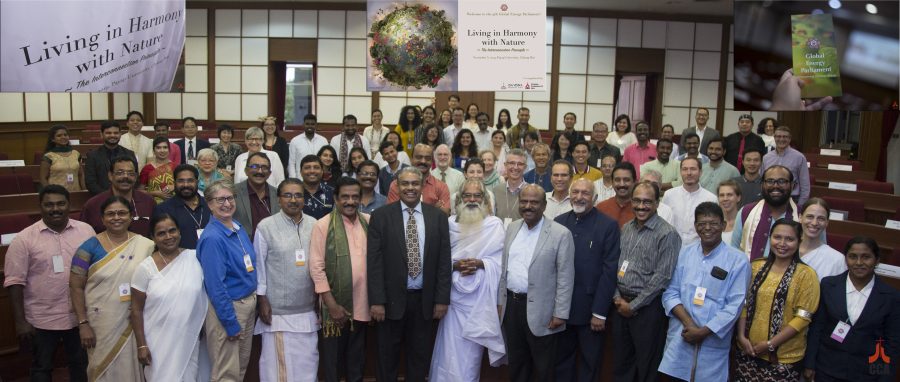Global Energy Parliament focuses on the theme, ‘Living in Harmony with Nature’
 Delegates at the 9th Global Energy Parliament
Delegates at the 9th Global Energy Parliament
CHIANG MAI, Thailand: The 9th Global Energy Parliament (GEP) focused on the theme ‘Living in Harmony with Nature’ highlighted that, “consumerist culture propagated by modern world is the root cause for devastating natural disasters the world is witnessing today.”
The GEP works with the objective that, “the excessive flow of negative energy leads to devastation and it has to be curbed in order to assure peaceful existence on planet Earth.”
The GEP held its ninth annual session at the Payap University Campus in Chiang Mai, Thailand on 5 November 2019 in conjunction with the opening of the Eco-School organised by the World Council of Churches (WCC) and the Christian Conference of Asia (CCA). The seventh session of the GEP hosted by the WCC was held at its headquarters in Geneva, 2013.
The GEP is a global parliament of volunteers- a non-political, international body constituted by scientists, peace educators, environmentalists, researchers, philosophers, students, specialists from various fields, and dedicated citizens in search of practical and innovative solutions for the formidable challenges of the world.
Following the formal inauguration of the GEP with the lighting of the lamp by the dignitaries present, the televised inaugural address was delivered by Deputy Minister for External and Parliamentary Affairs, Government of India, V. Muraleedharan.
Congratulating the GEP and its founder His Holiness Jagadguru Swami Isa, Minister Muraleedharan pointed out that the theme of the 9th GEP, ‘Living in harmony with nature’, was very apt given the challenges of climate change and natural disasters that have plagued the recent history of this planet. He added that the root cause for all of this was the disharmony of our living.
The imbalance in nature had been caused by the greed of human beings, the Minister rued, and so the theme of the 9th GEP was indeed timely, and he hoped that practical solutions and a plan of action would spring forth from this Parliament.
Highlighting what the GEP had achieved in its short history since 2003, Dr C.V. Anand Bose, President/Speaker of the GEP, lauded the GEP for having provided a platform and a converging point for transforming the ugliness of this world to create a ‘terrible beauty’ born out of such a convergence.
Dr Bose cited the Biblical example of Joseph and his foresight in advising Pharaoh to build a buffer stock during times of prosperity to tide over times of penury. He explained that the same kind of wisdom and foresight was needed to develop practical strategies in times of prosperity to prepare for the imminent times of penury.
In a special message delivered by the founder of the GEP Jagadguru Swami Isa stated, “All forms of life are closely bound with Nature, for there is no life without Nature and no Nature without life. The Human is considered as the consumer and Nature the product to be exploited, abused, and used in diverse ways with a reckless mentality. Modern educational systems have endowed the Human with the perspective that every living and non-living object around humans are created to be of service only to humans, but these concepts have to be changed for developing a culture of living in harmony with nature.”
According to Swami Isa, there is no dichotomy between the spiritual and the material, and the world is a manifestation of a supreme concept which reveals itself to the ordinary people as the subjective and the objective.
Welcoming the members of the Parliament, observers, and dignitaries from all over the world, General Secretary of CCA Dr Mathews George Chunakara pointed out that the GEP provided an opportunity to understand the GEP’s philosophy, ethos, and values, and that the CCA was happy to host this parliament in Chiang Mai.
Mathews George Chunakara added that the affirmation of the GEP that ‘all human beings belong to one Earth, one Water, one Fire, one Air, and one Space’, and, ‘we are all global citizens sharing a common future’, captures the essence of true ecumenism. The unity of the oikos, irrespective of race, class, caste, creed, colour, or gender, should be the common goal for our shared future. However, he pointed out, “This common future was endangered by many global challenges today, and we must address this together based on common values and as global citizens.”
Padmashree G. Shankar, an architect promoting harmony and sustainable living through designing and promoting eco-friendly architecture, delivered the keynote address.
Dr Amnauy Tapingkae, President of the Payap University, was felicitated during the opening session of the GEP and presented the Vidya Award for 2019 by the IVPT for his life-time achievement in the area of education spanning more than four decades.
The Parliament deliberated and voted on bills related to interconnection and nature, youth involvement in climate justice, women’s contribution to ecological concerns, sustainable development, water justice, advocating for afforestation and promotion of self-sustained food patterns.










